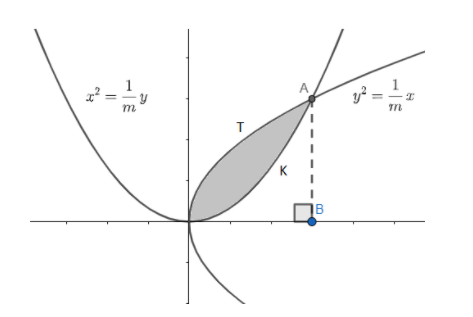Question
Question: If area between \(y=m{{x}^{2}},x=m{{y}^{2}}\) (m > 0) is \(\dfrac{1}{4}\) sq . units, then value of ...
If area between y=mx2,x=my2 (m > 0) is 41 sq . units, then value of m is
A. ±32
B. ±32
C. 2
D. 3
Solution
Find the intersection of both the parabolas given in problem. Draw a neat diagram to get an accurate bounded area. A area of any curve f(x) with x-axis from x = a to x = b is given as
Area=∫abf(x)dx
Equate the given area to the calculated area.
Complete answer:
Find the intersection of both the parabolas given in problem. Draw a neat diagram to get an accurate bounded area. A area of any curve f(x) with x-axis from x = a to x = b is given as
Area=∫abf(x)dx
Equate the given area to the calculated area.
Here, it is given that area between the curves y=mx2,x=my2 (m > 0) is 41 sq . units, then we need to determine the value of ‘m’.
As, both the curves are representing parabola of the forms of y2=4ax,x2=4ay→y=mx2can be written as x2=m1y,x=my2 can be written as y2=m1x
Hence, we can represent the given equations in form of parabolas x2=m1y,y2=m1x as

So, the area bounded by both the parabolas given in the question are represented by the shaded region in the above diagram. Hence, we need to calculate the area of OAO.
So, area of shaded region can be calculated by the difference of the area by y2=m1x with x-axis in first quadrant and the area by x2=m1y with the x-axis in first quadrant only.
Hence, we can get area of shaded region as
Area of shaded region = (area of OTAB – area of OKAB)
So, area OTAB and OKAB can be calculated with help of integration.
So, let us find the intersection point of both the parabolas i.e. A.
So, we have
y2=m1x ………………. (i)
x2=m1y ……………… (ii)
Put the value of x from equation (i) i.e. x=my2to the equation (ii). So, we get
(my2)2=mym2y4=mym3y4−y=0y[m3y3−1]=0
y = 0, m3y3−1=0
y = 0,m3y3−1=0
y = 0,y3=m31
y = 0,y=m1
So, put y = 0 to any equation (i) or (ii), we get x = 0.
Now, put y=m1 to equation (i) to get the value of x. So, we get
(m1)2=m1xx=m1
Hence, point A is given as (m1,m1) because x = 0, y = 0 i.e. (0, 0) represents origin, so, we cannot take (0, 0) as point A.
Hence, we can get area of OTAK as
Area of shaded region = area of OTAB – area of OKAB.
So, we can get area of OTAB by integrating
y2=m1x→y=mx from 0→m1 as AB can be represented as x=m1, Similarly area of OKAB can be calculated by integrating x2=m1y→y=mx2 from o→m1 .
So, we get
Area of shaded region
=0∫(m1)mxdx−0∫(m1)mx2dx,=m10∫(m1)xdx−m0∫(m1)x2dx
We know ∫xndx=n+1xn+1
So, we get
Area of shaded region =
m121+1x21+10(m1)−m[3x3]0m1,=m132x230(m1)−3m[x3]0(m1),=m132(m1)23−0−3m((m1)3−0),=3m2×m231−3m3m,=3m21+232−3m21=3m22−3m21=3m21
Hence,
Area of the shaded region = 3m21
As, it is given that the area bounded by the given parabolas id 41.
So, we get
3m21=41,3m2=4m2=34m=±32
Hence, option (b) is the correct answer.
Note: Another approach for the area of bounded region would be that we can calculate it w.r.t. ‘dy’ (y-axis) as well. Here, we need to integrate x=my2,x=my from 0→′m1′ with respect to ‘dy’ and hence find the difference of them to get the required area.
One may get confused with the equation m3y3=1,m3y3−1=0. As, we calculated the value of y→m1 only, but one may think that there are other two values of y that are possible as well. But, we know the one root of x3=1→1. And other roots of equation x3=1→w,w2 which are non-real numbers, hence, we can relate this equation with m3y3=1,y3=m31. So, another two roots of the equation will be imaginary, except the root m1. And one may observe that the intersection of both the parabolas is one point. So, other values of ‘y’ except ′m1′ will not be real.
